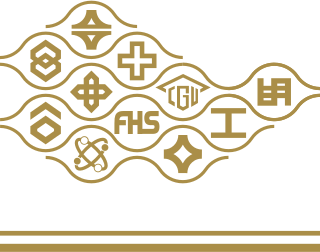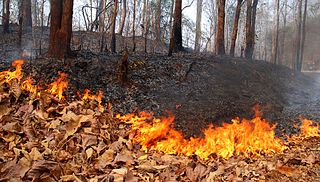
The chemical industry comprises the companies that develop and produce industrial, specialty and other chemicals. Central to the modern world economy, it converts raw materials into industrial and consumer products. The plastics industry contains some overlap, as some chemical companies produce plastics as well as chemicals.

Cancer Alley is the regional nickname given to an 85-mile (137 km) stretch of land along the Mississippi River between Baton Rouge and New Orleans, in the River Parishes of Louisiana, which contains over 200 petrochemical plants and refineries. This area accounts for 25% of the petrochemical production in the United States. Environmentalists consider the region a sacrifice zone where rates of cancer caused by air pollution exceed the US government’s own limits of acceptable risk. Others have referred to the same region as "Death Alley."

Rayong is a city on the east coast of the Gulf of Thailand and the capital of Rayong province. It covers tambons Tha Pradu and Pak Nam and parts of tambons Choeng Noen and Noen Phra, all within Mueang Rayong district. As of 2016 the population was 64,256 (est.). The main industry is fishing, and it is also the main producer of Thailand's fish sauce. It is also the center of the chemical and auto industries. In 2012 Ford Motor Company opened an assembly plant in Rayong to expand Ford's presence in the ASEAN area, employing some 2,200 people.

Formosa Plastics Group is a titular Taiwanese conglomerate of diverse interests, including biotechnology, petrochemical processing and production of electronics components. The group was founded by Wang Yung-ching and his brother Wang Yung-tsai, and is chaired by Wong Wen-yuan. Despite its name, its holdings include several companies prominent in the high tech electronics sector, including VIA Technologies and Nanya Technology Corporation.

Thailand's dramatic economic growth has caused numerous environmental issues. The country faces problems with air, declining wildlife populations, deforestation, soil erosion, water scarcity, and waste issues. According to a 2004 indicator, the cost of air and water pollution for the country scales up to approximately 1.6–2.6% of GDP per year. As such, Thailand's economic growth has come at great cost in damage to its people and environment.

Formosa Plastics Corporation is a Taiwanese plastics company based in Taiwan that primarily produces polyvinyl chloride (PVC) resins and other intermediate plastic products. It is the corporation around which influential businessman Wang Yung-ching formed the Formosa Plastics Group, and it remains central to the Group's petrochemical operations. The president of Formosa Plastics Corp. (FPC) is Jason Lin (林健男).
Rubbertown is a neighborhood of Louisville, Kentucky, located along the Ohio River. During World War II, it became the home of many industrial plants which remained after the war and led to its name. Its largest businesses include American Synthetic Rubber, Borden Chemical, DuPont Dow Elastomers, Noveon, Dow Chemical, and Zeon Chemicals.

Mueang Rayong is the capital district of Rayong province, Thailand. The provincial administration is in Tambon Map Ta Phut.
Yokkaichi asthma refers to cases of chronic obstructive pulmonary disease, chronic bronchitis, pulmonary emphysema, and bronchial asthma in humans and various environmental changes usually attributed to sulfur dioxide (SO2) emissions which appeared as smog over the city of Yokkaichi in Mie Prefecture, Japan between 1960 and 1972, though other SOx compounds have been proposed. The generally accepted source of the sulfur oxide pollution was the Yokkaichi Kombinato petrochemical processing facilities and refineries built in Yokkaichi between 1959 and 1972 which did not properly desulfurize the high sulfur content in its crude oil. Yokkaichi asthma is considered one of the Four Big Pollution Diseases of Japan and was the subject of Japan's first court case related to pollution.
Mossville is a small, predominantly African American unincorporated community on the outskirts of Lake Charles in Calcasieu Parish, Louisiana, United States. It is part of the Lake Charles Metropolitan Statistical Area and is sandwiched between Sulphur to the west and Westlake to the east. With the Sasol expansion project almost all of the homes north of Old Spanish Trail have now been either moved to other locations or torn down and the land completely deforested.
The eastern seaboard of Thailand, more frequently known as the "Eastern Economic Corridor" (EEC), is a developing economic region which plays a key role in Thailand's economy. It is Thailand's center for export-oriented industries. High value goods, such as Japanese branded automobiles, which are manufactured there and shipped elsewhere, are among the many exports. The region includes Chonburi Province, Chachoengsao Province, and Rayong Province with Samut Prakan Province on the periphery.
Morrisonville was a small town in Iberville Parish, Louisiana, United States that was contaminated with industrial pollution from a nearby Dow Chemical Company vinyl chloride factory. The town's residents — predominantly African American — were relocated in 1990 to Morrisonville Estates in Iberville Parish and Morrisonville Acres in West Baton Rouge Parish by Dow.
Map Ta Phut is a town in Rayong Province, Thailand. It is the site of Thailand's largest industrial park, the Map Ta Phut Industrial Estate. Provincial offices are in Map Ta Phut.
The Rayong oil spill occurred on July 27, 2013, in the Gulf of Thailand, off the coast of Ko Samet and Map Ta Phut in Rayong Province.
Laem Chabang is a port city municipality in Si Racha and Bang Lamung districts of Chonburi Province, Thailand. It includes Thung Sukhla subdistrict (tambon) and parts of subdistricts Bueng, Nong Kham and Surasak of Si Racha District and part of Bang Lamung township of Bang Lamung District all of Chonburi province. As of 2019 it had a population of 88,271. The city has grown up around the port, but also serves as a major stop on the coastal highway linking Pattaya and Bangkok via Sukhumvit Road. The city is also known for hosting a Japanese retirement community with specialty stores geared towards them.

The Eastern Economic Corridor (Abrv: EEC; Thai: ระเบียงเศรษฐกิจภาคตะวันออก, romanized: Rabīang Sētthakit Phāk Tawan-ǭk, RTGS: Rabiang Setthakit Phak Tawan-ok, pronounced [rā.bīa̯ŋ sèːt.tʰā.kìt pʰâːk tā.wān.ʔɔ̀ːk]) officially the Eastern Special Development Zone (ESDZ), is a special economic zone of three provinces in eastern Thailand. Collectively, these provinces occupy an area of 13,266 km2 (5,122 sq mi), and in 2016 had an estimated population of over 2.8 million.

The Bangkok–Nong Khai high-speed railway or Northeastern high-speed rail line is a high-speed railway under construction in Thailand. It will be the first high-speed line in Thailand. It will be constructed in multiple phases; the first phase, between Bangkok and Nakhon Ratchasima, is expected to open in 2026 after multiple delays. The rest of the line is expected to be operational by 2028.
Bo Win, also written as 'Bowin', is a tambon (subdistrict) of Si Racha District, Chonburi Province, Thailand.
Formosa Petrochemical Corporation is a Taiwanese energy company engaged in refining of crude oil, distribution of refined petroleum products, the production and sales of olefins, and the generation of electricity and steam. It was founded as a subsidiary of Formosa Plastics Group, and went public in 2003. It is headquartered in Mailiao Township, Yunlin County, in Taiwan.










